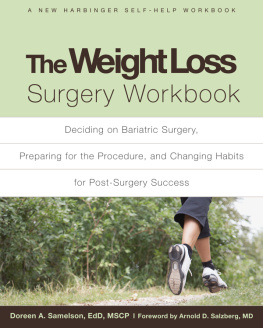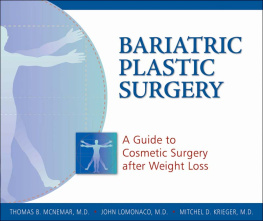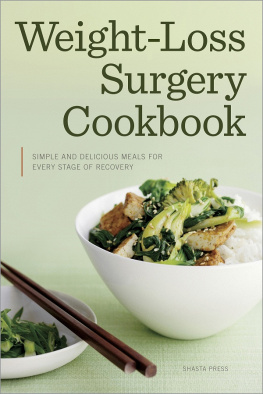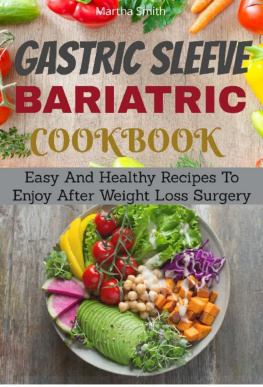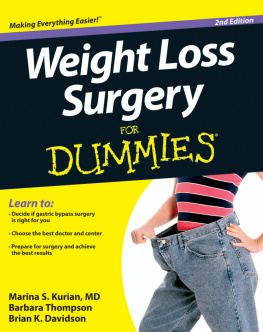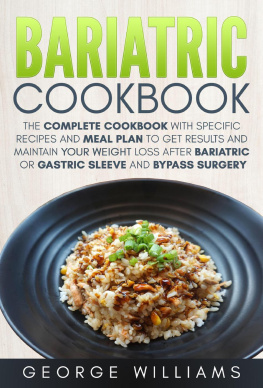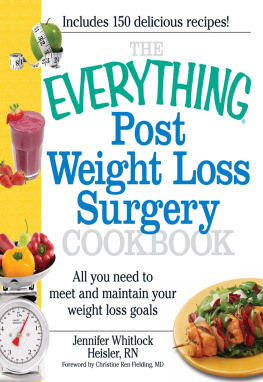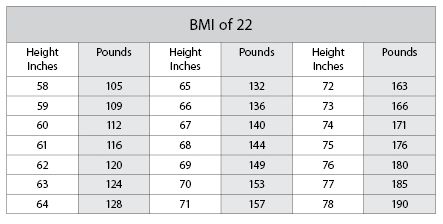Doreen A. Samelson - The Weight Loss Surgery Workbook: Deciding on Bariatric Surgery, Preparing for the Procedure, and Changing Habits for Post-Surgery Success
Here you can read online Doreen A. Samelson - The Weight Loss Surgery Workbook: Deciding on Bariatric Surgery, Preparing for the Procedure, and Changing Habits for Post-Surgery Success full text of the book (entire story) in english for free. Download pdf and epub, get meaning, cover and reviews about this ebook. year: 2011, publisher: New Harbinger Publications, genre: Home and family. Description of the work, (preface) as well as reviews are available. Best literature library LitArk.com created for fans of good reading and offers a wide selection of genres:
Romance novel
Science fiction
Adventure
Detective
Science
History
Home and family
Prose
Art
Politics
Computer
Non-fiction
Religion
Business
Children
Humor
Choose a favorite category and find really read worthwhile books. Enjoy immersion in the world of imagination, feel the emotions of the characters or learn something new for yourself, make an fascinating discovery.
- Book:The Weight Loss Surgery Workbook: Deciding on Bariatric Surgery, Preparing for the Procedure, and Changing Habits for Post-Surgery Success
- Author:
- Publisher:New Harbinger Publications
- Genre:
- Year:2011
- Rating:3 / 5
- Favourites:Add to favourites
- Your mark:
The Weight Loss Surgery Workbook: Deciding on Bariatric Surgery, Preparing for the Procedure, and Changing Habits for Post-Surgery Success: summary, description and annotation
We offer to read an annotation, description, summary or preface (depends on what the author of the book "The Weight Loss Surgery Workbook: Deciding on Bariatric Surgery, Preparing for the Procedure, and Changing Habits for Post-Surgery Success" wrote himself). If you haven't found the necessary information about the book — write in the comments, we will try to find it.
Develop Your Personal Plan for Weight Loss Surgery Success
How do you imagine life after weight loss surgery? Maybe you see yourself living a more exciting life than ever before, participating in activities you havent enjoyed in years. If you have been stuck in an ongoing struggle with obesity, your dreams for life after bariatric surgery may be as simple as being able to sit in a seat at a movie theater or going for a walk outside. Chances are, along with those dreams, you also have lingering questions and concerns about the bariatric surgery process. If youre seeking honest answers, The Weight Loss Surgery Workbook can help.
This workbook will be your guide every step of the way as you prepare to make a smooth transition into post-surgery life. Written by a medical psychologist who has counseled many clients through weight loss surgery, it offers skills from cognitive behavioral therapy to help you make the critical pre-surgery lifestyle changes and adjustments to your eating and exercise habits that will enable you to maintain the best results after the procedure.
This workbook will help you:
- Choose the right kind of surgery for you
- Find a qualified surgeon and dietician
- Control problem eating and emotional eating
- Make peace with your body after surgery
This book has been awarded The Association for Behavioral and Cognitive Therapies Self-Help Seal of Merit an award bestowed on outstanding self-help books that are consistent with cognitive behavioral therapy (CBT) principles and that incorporate scientifically tested strategies for overcoming mental health difficulties. Used alone or in conjunction with therapy, our books offer powerful tools readers can use to jump-start changes in their lives.
Doreen A. Samelson: author's other books
Who wrote The Weight Loss Surgery Workbook: Deciding on Bariatric Surgery, Preparing for the Procedure, and Changing Habits for Post-Surgery Success? Find out the surname, the name of the author of the book and a list of all author's works by series.

